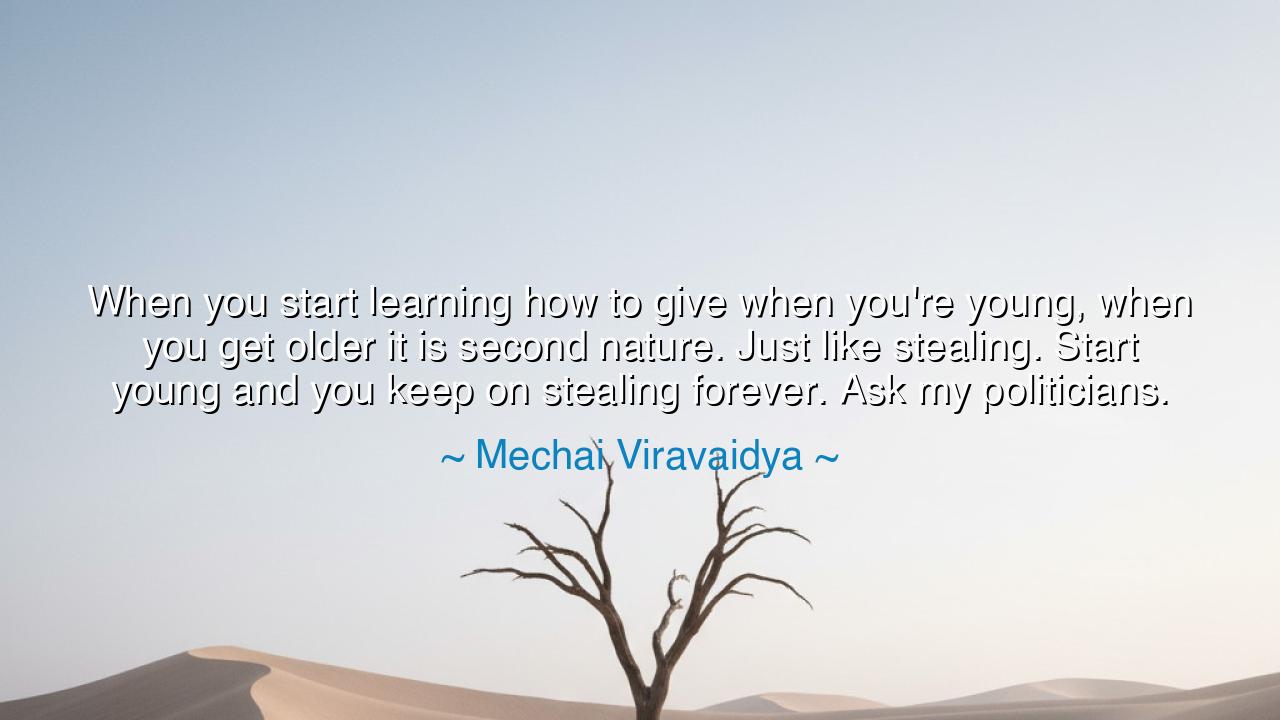
When you start learning how to give when you're young, when you
When you start learning how to give when you're young, when you get older it is second nature. Just like stealing. Start young and you keep on stealing forever. Ask my politicians.






When Mechai Viravaidya declared, “When you start learning how to give when you're young, when you get older it is second nature. Just like stealing. Start young and you keep on stealing forever. Ask my politicians,” he spoke not only as a reformer but as a moral physician diagnosing the sickness of society. His words are sharp with irony and heavy with truth. Beneath the humor lies a profound teaching about habit, morality, and the shaping of character. He reminds us that both virtue and vice grow from the same soil—the habits we plant early in life. Whether a man becomes a giver or a thief depends on the seeds nurtured in his youth. Thus, his jest about politicians conceals an ancient truth: that the soul learns by repetition, and what one practices in youth, one perfects in age.
In the tone of the ancients, Mechai’s wisdom mirrors that of the philosophers who believed that education is not the filling of a vessel but the formation of a soul. Just as a tree bends toward the sun from its earliest sprout, so too does the human heart lean toward what it has been trained to love. If a child learns generosity, compassion flows from him as naturally as breath. But if he learns selfishness or deceit, those traits too will harden into instinct. “Start young,” Mechai warns, for habits formed in innocence become chains or wings in maturity. Character is the harvest of early choices, and time only deepens the grooves that youth begins.
Consider the story of Emperor Ashoka, who as a young ruler knew only conquest and bloodshed. Raised to believe that power was glory, he waged wars without mercy. But after the massacre at Kalinga, the cries of the slain shattered his spirit, and he turned toward compassion and peace. His transformation was monumental, but also rare—for few men can unlearn the habits of the heart once they have taken root. Mechai’s words echo through Ashoka’s story: how much better if kindness had been his lesson from the start! The effort to teach the young generosity, therefore, is not just moral—it is civilizational. A nation that raises its children to give rather than take creates leaders who heal rather than exploit.
In his jesting reference to “my politicians,” Mechai also casts light on the corruption of adulthood, when early lessons of greed are rewarded by power. The thief of childhood becomes the schemer of public life; the one who cheats in games becomes the one who cheats in office. In this, his laughter is tinged with lament—for he sees how societies that fail to nurture virtue in their children will reap dishonor in their leaders. The thief and the giver are born of the same process—habit strengthened by years—but their destinies diverge like rivers, one nourishing the land, the other draining it.
Yet within this bitter humor lies a note of hope. For Mechai, who devoted his life to public service and social change, believed that generosity can be taught, and that early acts of giving shape a lifelong spirit of empathy. To teach a child to share is to awaken a force far greater than charity—it is to open the eyes of the heart. He understood, as the sages of old did, that virtue must be practiced to be possessed. The act of giving is not only for the receiver—it transforms the giver, training the soul to find joy in compassion rather than conquest. In time, such training becomes second nature, the natural posture of a noble life.
This teaching also reveals the law of duality that governs human nature: every strength begins as a discipline, and every corruption begins as a habit. The young thief learns the thrill of taking; the young giver learns the peace of giving. Both grow old perfecting what they began. The difference lies not in fate but in choice, and in the guidance of those who shape the young. Families, teachers, and societies bear the sacred duty of planting the right habits early, for by the time a man rules a nation—or his own household—it is too late to plant new roots.
So let the lesson of Mechai Viravaidya ring like a bell for the generations: teach generosity early, and you will raise a people who heal the world. Teach greed, and you will raise rulers who devour it. Every act of giving by the young is a rehearsal for greatness; every act of selfishness, a rehearsal for tyranny. Therefore, plant the seeds of kindness, water them with example, and guard them from the weeds of cynicism. For as Mechai reminds us with humor edged in truth, the soul—like the soil—grows what it is taught to grow, and whether it yields thieves or saints depends on how early we teach the hands to give.






AAdministratorAdministrator
Welcome, honored guests. Please leave a comment, we will respond soon